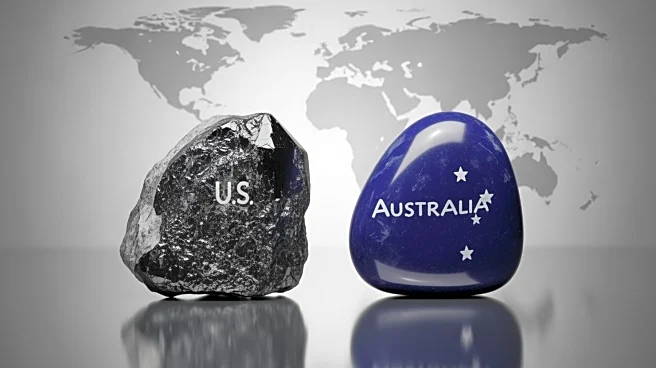What's Happening?
The United States and Australia have entered into a strategic agreement to enhance the supply of rare earths and other critical minerals. This initiative is part of the Trump administration's efforts to reduce reliance on China, which currently dominates
the global market for these essential materials. Australian Prime Minister Anthony Albanese announced that the deal would support $8.5 billion worth of projects aimed at expanding mining and processing capabilities in both countries. The agreement includes a $1 billion investment over the next six months and focuses on accelerating investments in processing facilities in Australia. Additionally, the US plans to invest in a 100 tonnes-per-year advanced gallium refinery in Western Australia and provide $2.2 billion in financing for critical minerals projects through its Export-Import Bank.
Why It's Important?
This agreement is significant as it addresses the strategic vulnerability posed by China's control over the rare earths market, which is crucial for various industries, including defense and technology. By diversifying supply chains and increasing domestic processing capabilities, the US and Australia aim to secure access to these materials, thereby reducing potential disruptions caused by geopolitical tensions. The deal also represents a broader effort to counter China's influence in the global market and ensure stable supply chains for critical industries. Companies involved in rare earths production, such as MP Materials and Lynas Rare Earths, stand to benefit from increased investment and support, potentially leading to job creation and economic growth in the sector.
What's Next?
The agreement sets the stage for further collaboration between the US and Australia on issues such as pricing, permitting, and regulatory frameworks for the sale of companies and projects in the critical minerals sector. As the partnership progresses, both countries are expected to continue investing in infrastructure and technology to enhance their processing capabilities. The initiative may also prompt other nations to reevaluate their reliance on Chinese rare earths and explore similar partnerships to secure their supply chains. The success of this agreement could lead to a shift in the global rare earths market, with more countries seeking to diversify their sources and reduce dependency on China.

















